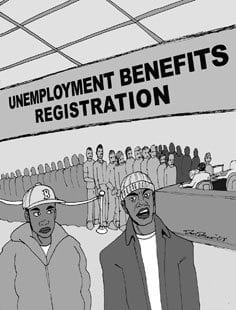
Economic myths
| “I could have told them months ago that the country was in trouble.” |
Few Americans were surprised by the National Bureau of Economic Research’s announcement last week that the nation is in a recession. What may have surprised many, however, was the bureau’s statement that the recession began last December. The usual indicia of recession are declining industrial output and increasing unemployment. However, America’s problems are even more extensive than that when one considers the collapse of the banking system and the fact that the whole automobile manufacturing industry is seemingly bankrupt.
How did we get into such a mess? For decades, Americans have heard that the nation’s system of private enterprise is the most productive in the world. What could have gone wrong?
Before America became an industrial power, agriculture was the country’s dominant economic engine. Anyone with land had the right to plant crops and become subjected to both the vicissitudes of the weather and the forces of the market. It was unacceptable to use public funds to defray the risks confronted by farmers.
Then came the Great Depression. Farm subsidies were established to protect the nation’s agricultural base. That system of payments to farmers has now become an entitlement that is practically ignored by citizens who do not live in the farm belt. The change in farm policy established for the first time the role of government in using public funds to influence economic results in opposition to the dire operation of the free market.
This approach to economic planning was so abhorrent to staunch advocates of unadulterated free enterprise that it never took hold in any industry except in farming. During the Cold War, communist nations prepared five-year economic development plans, a process that was soundly repudiated by Americans. After all, how would it be possible to develop such plans in a free enterprise economy in which everyone was free to pursue his own dreams?
There is some rationale for this position, since government planners did not own the means of production, as is the case under communism. But the adamant opposition to such planning has obscured the importance of the government’s role in economic activity, especially in a global business environment. When competition is internal within the U.S., it remains a domestic matter. But when competition is global, success or failure becomes a matter of international importance.
There is no way that America can remain a leading economic power in this age of global business and free trade without the active involvement of government, especially when governments of other nations are doing what they can to support their own business interests. Communist China, for example, has developed a capitalism-based economic sub-system that has been thriving and has become fiercely competitive.
Many analysts now believe that it was a strategic error for the U.S. to relinquish such a large portion of its manufacturing base. Will Americans be saying the same thing years from now if the auto companies go belly up? The unemployment rate is now at its highest point in 15 years — how will this problem be remedied if the auto industry collapses?
Today, government must be involved in economic development. It makes no sense for capitalism purists to reject the investment of public funds in business for fear of a national shift to socialism. However, simple fairness requires that the public have an equity interest if public funds are invested. If such investments are necessary to provide jobs for Americans, there is no other alternative.

![Banner [Virtual] Art Gallery](https://baystatebanner.com/wp-content/uploads/2024/04/NJ-H_1-150x150.jpg)




